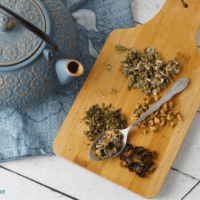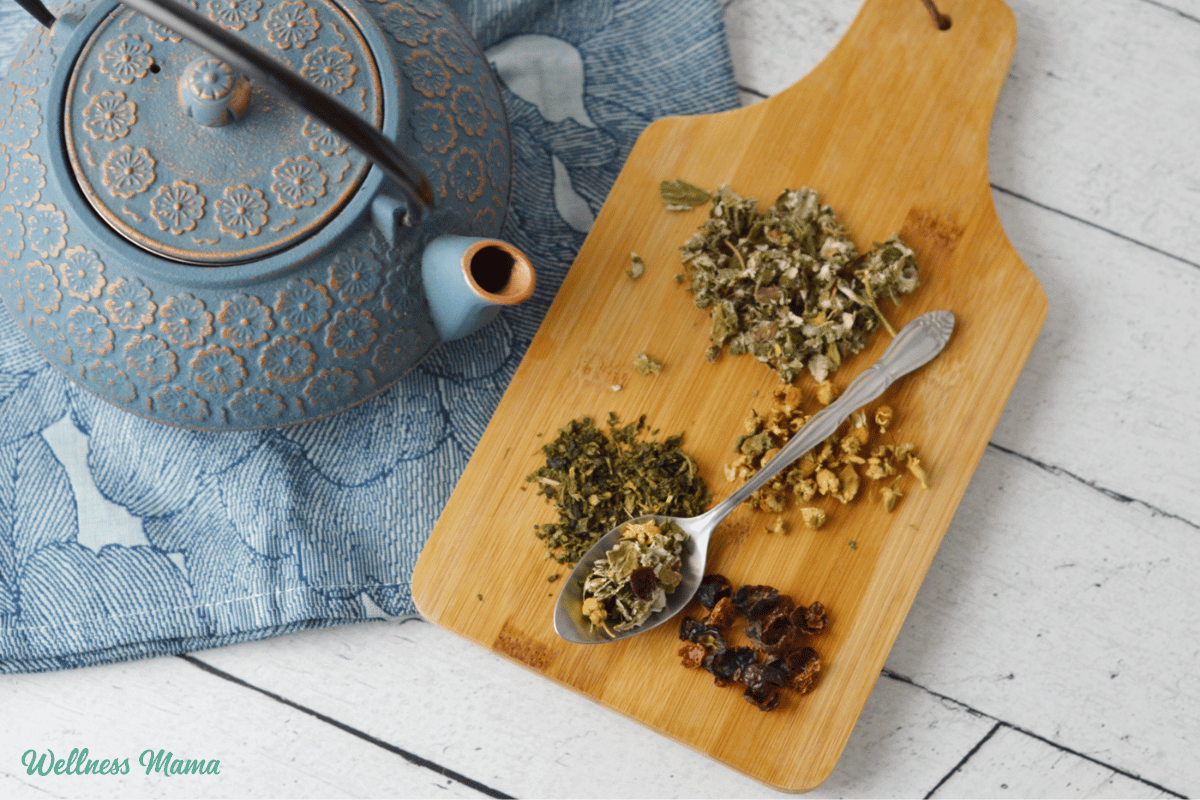During my pregnancies, I drank a lot of red raspberry leaf tea, tried to get plenty of sleep, and even did some underwater headstands (to turn a breech baby). Pregnancy comes with its own discomforts and pregnancy tea is one way to help.
Not all herbal teas are safe for pregnant women so it’s important to choose herbs that are. There are plenty of healthy pregnancy teas online and in stores, but the individual tea bags can quickly get expensive. When I was expecting I liked to use bulk herbs and brew a gallon at a time. It’s an easy and cost-friendly way to ease pregnancy complaints and get some extra nutrition.
Which Teas Are Pregnancy-Safe?
We drink a lot of tea at our house. Iced tea in the summer (like this lavender peach tea), and hot teas in the cooler months. Then there’s green tea, oolong, and others. There are a few things to consider before drinking tea when you’re expecting though.
Most healthcare providers caution against lots of caffeine during pregnancy. Caffeine increases blood pressure and heart rate, both things that we don’t want to do during pregnancy. It also crosses the placenta and baby doesn’t have the enzymes to process caffeine yet. In animal studies, large amounts of caffeine caused birth defects, but researchers haven’t seen conclusive evidence in humans. However, other human studies did show an increased risk of miscarriage with lots of caffeine.
Black tea has about 45 mg of caffeine in a 6-ounce cup, while green tea clocks in at a close 40 mg. An 8-ounce latte can easily have triple that amount. So how much is too much? The exact safe amount depends on who you ask but in general, experts recommend capping caffeine consumption at 150-200mg per day. There is some evidence in pregnant women that small amounts of caffeine are okay, but many choose to minimize or skip it altogether.
Herbal teas are my natural go-to when I need something caffeine-free. Not every herb is pregnancy-safe though.
Common Herbal Pregnancy Teas
We don’t need to throw the baby out with the bath water (or tea in this case). There are plenty of safe herbs that can help us better manage pregnancy and provide necessary nutrients. Here are a few herbs to consider:
- Chamomile – Helps soothe anxiety, calms an upset stomach, and relaxes the mind for better sleep. This is great for morning sickness and third-trimester sleeplessness.
- Fennel – Is great for digestion, nausea, and heartburn and boosts breastmilk supply during lactation. It’s also a favorite for helping soothe colicky infants.
- Dandelion Leaf – Has potassium, calcium, vitamins A and C, among other nutrients. The leaf is also diuretic and helps the body remove waste products from the blood and urinary tract. Unlike prescription diuretics, it replenishes nutrients like potassium.
- Dandelion root – A popular ingredient in herbal “coffee” blends. The root acts as a liver tonic and helps the liver process hormones and releases bile for better fat digestion. In Chinese medicine, it’s also used for breast health and to reduce constipation.
The Benefits of Pregnancy Tea
The above herbs are great for pregnancy, but I didn’t include all of them in this particular pregnancy tea recipe. You can of course drink them separately or add them to your pregnancy brew, but I wanted to focus on a few other powerhouse ingredients.
Nettle Leaf
Yes, the same nettle that gives an uncomfortable stinging feeling. Once it’s cooked or brewed into tea the prickles disappear. Nettle leaf is great for both pregnancy and postpartum, especially for lactating moms. It boosts breastmilk production and helps make it more nutrient-rich. It’s rich in amino acids, chlorophyll, calcium, magnesium, silica, iron, and vitamins A, C, E and K.
It’s also been traditionally used by indigenous peoples to help ease postpartum hemorrhage. Nettle helps with healthy blood-sugar levels and flushing toxins from the kidneys and urinary tract. It also strengthens the adrenal glands and provides energy during stressful times (like pregnancy!).
Red Raspberry Leaf
This is my all-time favorite pregnancy herb when it comes to delicious tea. I’d regularly have a pitcher of it sitting in my fridge when I was expecting, and I still drink it often. Red raspberry is rich in nutrients like magnesium, potassium, iron, calcium, and vitamins A, B, C, and E. Vitamin E is an antioxidant to protect our cells, while vitamin C aids our immune system. And B vitamins help with first-trimester morning sickness and nausea, and the leg cramps that often accompany the third-trimester.
Raspberry leaf also strengthens the uterus and pelvic floor which can lead to a smoother labor. Experts are divided on its safety during the first trimester, but I personally use it all through pregnancy. In early pregnancy, there’s evidence it helps with morning sickness and miscarriage prevention. When taken later in pregnancy it may help reduce excessive postpartum bleeding.
Alfalfa and Oatstraw
These herbs are both used as nutrient builders and like nettle have a mineral-rich taste. Alfalfa leaf helps boost breastmilk supply. It also has high levels of vitamin K, beta-carotene, and some calcium.
Oatstraw is lighter tasting than alfalfa but it’s also packed with nutrients. You’ll find silica, magnesium, phosphorus, chromium, iron, calcium, and vitamins A, B, C, E, and K. It helps strengthen the nervous system, eases anxiety, and helps with sleeplessness and insomnia.
Oatstraw also improves blood flow and supports healthy blood pressure. During pregnancy our blood volume increases significantly and herbs like oatstraw can help.
Spearmint or Peppermint
Spearmint is a little milder and gentler than peppermint, but both are great for a variety of digestive complaints. Mint can help with the upset stomach and nausea that often accompanies early pregnancy. Smelling mint essential oil can even help with nausea during labor.
Peppermint in large amounts can reduce breastmilk supply and cause or worsen GERD and heartburn. If you’re struggling with heartburn during pregnancy you’ll want to skip the peppermint.
Rosehips
This fruity-tasting herb is delicious and really high in vitamin C. They’re antioxidant and nourishing. Rosehips add a tart, refreshing flavor to the tea that tastes especially good iced. I even include them in my wild cherry bark cough syrup for an extra immune system boost!
Precautions and Safety
If you ask 10 different healthcare providers about herbs during pregnancy you’re likely to get 10 different answers. Some experts like to err on the side of caution and recommend against all herbs… but they will recommend Tylenol. Others point to the safety evidence we do have, including how some herbs have been used widely during pregnancy for hundreds (if not thousands) of years.
On the other hand, credible herbalists and midwives usually have more herbal knowledge than conventional OBGYNs. The above herbs are typically considered safe during pregnancy, but thoughts and opinions vary. Be sure to discuss using herbal remedies with your trusted healthcare provider before starting something new in pregnancy.
How to Make Pregnancy Tea
Since this is a loose-leaf tea I add the herbs directly to the hot water and then strain. You could also use a tea ball or make your own tea bags. It saves time because you make it in bulk and scoop some out as needed. You can easily double or even triple the recipe if preferred.

Nourishing Pregnancy Tea Recipe
Servings
Ingredients
- ¼ cup red raspberry leaf
- 1 TBSP nettle leaf
- 1 TBSP alfalfa leaf (or oatstraw)
- 2 TBSP peppermint leaf (or spearmint, optional)
- 2 TBSP rosehips
- 2 TBSP chamomile flowers
Instructions
- Combine all of the ingredients in a clean pint-sized mason jar.
- Stir or gently shake to combine.
- Boil 8 ounces of hot water and add 2 teaspoons of the pregnancy tea.
- Cover and steep for 10-15 minutes, then strain well. Sweeten with honey or stevia if desired.
Nutrition
Notes
Do you drink tea during pregnancy? What are your favorite herbs to include? Leave a comment and share below!


Leave a Reply